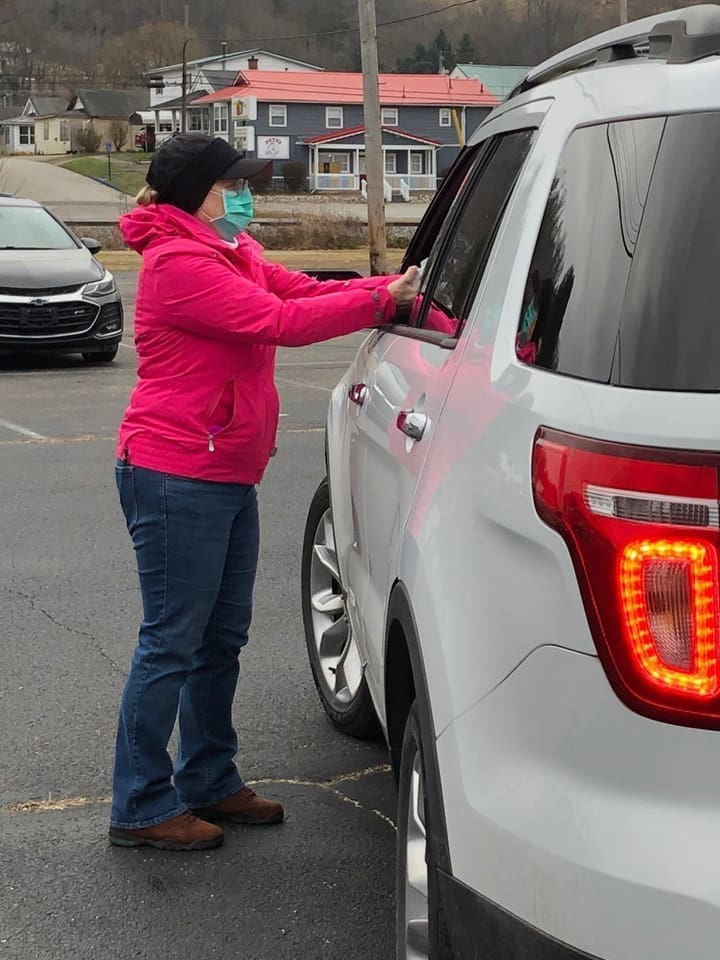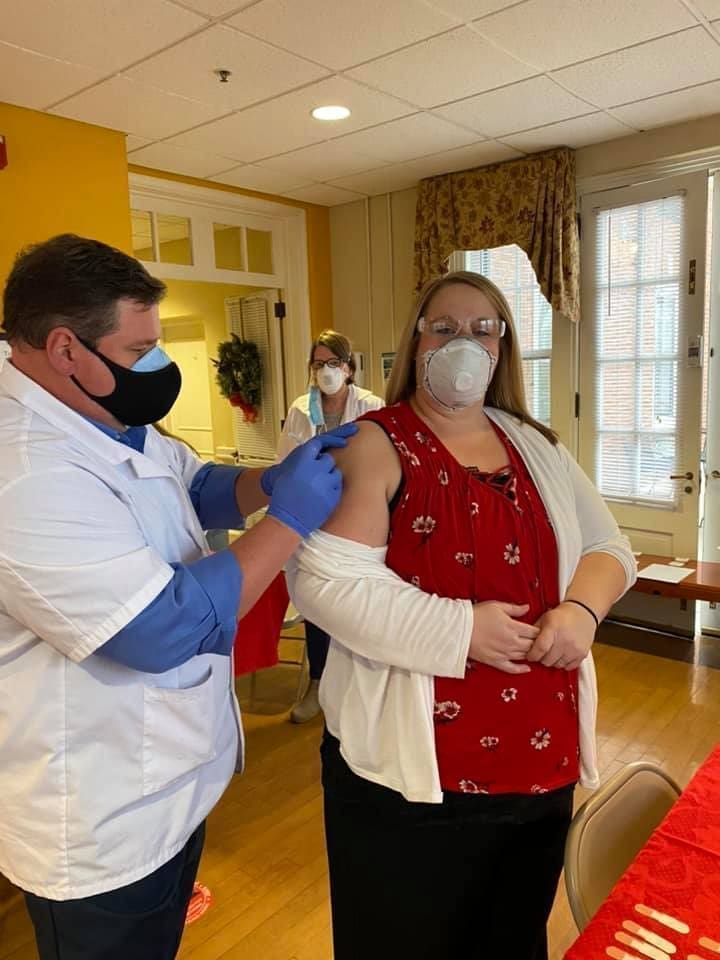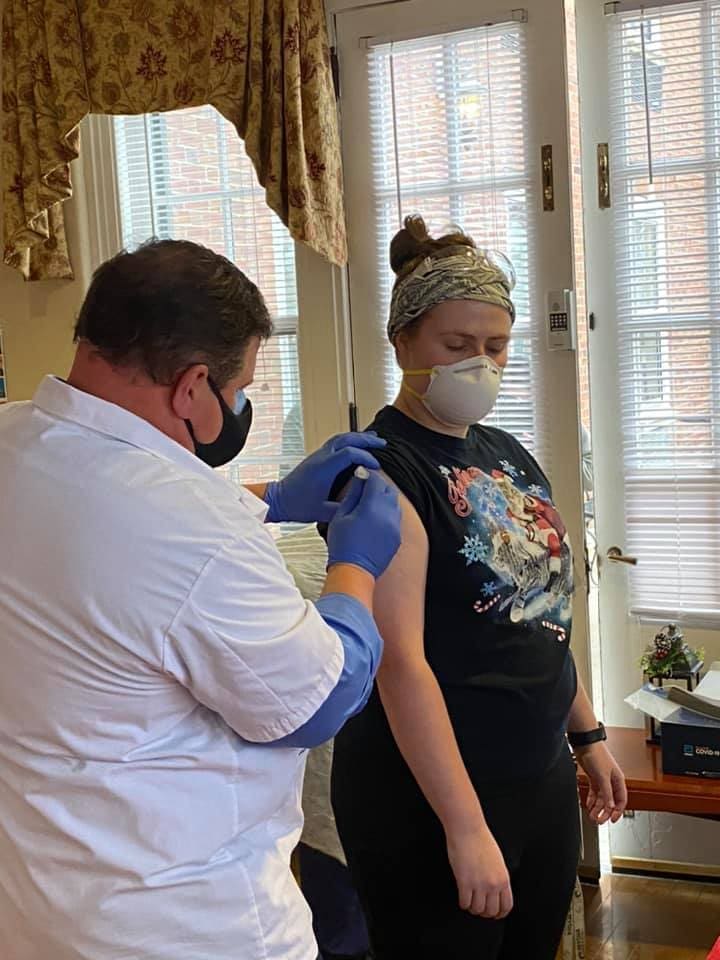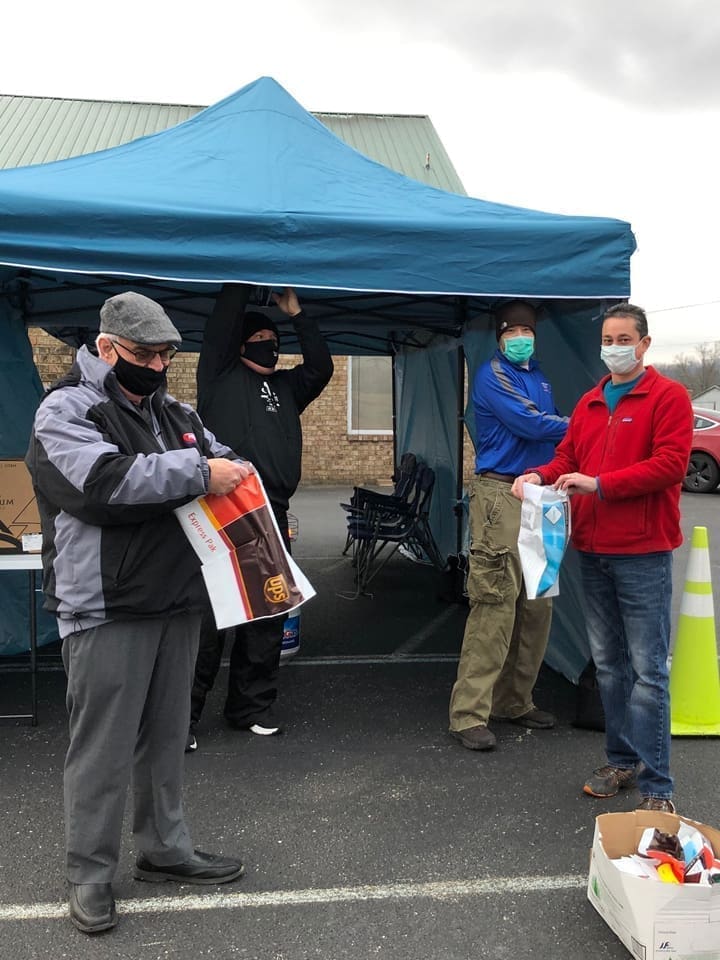To embark on an inspirational hour, ask Lynne Fruth about West Virginia’s success in getting COVID-19 vaccines to patients’ arms.
The Fruth Pharmacy president will beam with stories of pharmacists’ personal commitment, the senior team’s hands-on approach, the regional chain’s nimbleness, business-people’s adaptability, and longstanding ties to the community.
All of her stories contribute to an unmistakable narrative: the priorities of taking care of patients and proving pharmacy’s unique ability to do just that.
Thinking Ahead, Standing Up for West Virginia
Fruth – a member of the National Association of Chain Drug Stores Board of Directors – is used to picking up the phone to call federal and state government leaders. That is exactly what she did in October 2020, as predictions of an emergency use authorization for the first COVID-19 vaccine became more and more real.
She urged West Virginia Governor Jim Justice’s executive team to plan ahead to advocate with the federal government for the state to receive a fair allocation of vaccine doses.
“As a small rural state I was concerned that West Virginia would be wanting for vaccines,” Fruth recalls.
Fruth already was thinking ahead: if given the chance, her team would be ready to help get the vaccines to patients – and reflect well on the state and on pharmacies.
COVID-19 Tests as a Proving Ground
The 29-store chain operating in West Virginia, Ohio and Kentucky already had demonstrated significant value during the pandemic – including a robust COVID-19 testing program.
In West Virginia, Fruth Pharmacy partnered with the state to present large testing events.
“We would do 300 or 400 tests – 500 on a good day,” Fruth says.
The company went on to offer pharmacist-observed, self-administered, anterior nasal swab testing at all of its stores. The evolution of the testing program provided a solid read on the team’s commitment to meeting patients’ needs.
“We only offered the tests in our stores with drive-thrus, at first,” Fruth recalls. “But our pharmacists wanted to do the tests even if there were no drive-thrus. In the rain and snow, they would go out to patients’ cars in the parking lot.”
Fruth also gives credit to her tight-knit senior team which prides itself on smart and swift action and on a hands-on approach to all aspects of the testing program.
Fruth says the ability to stand up testing events from start to finish – with advertising, signage, traffic control, logistics, and sending the tests to the lab – proved to the state that a company like hers can react quickly and can perform similarly with a COVID-19 vaccination program.
Nursing Homes First Up for COVID-19 Vaccinations
In West Virginia, Governor Justice looked to a combination of regional, independent and national pharmacies to vaccinate nursing home residents.
“We’re here, we’re ready and we’re efficient. We can take lots on if we have the vaccines,” is the way that Fruth states pharmacies’ pledge. They lived up to that pledge, and helped West Virginia become the first state to complete vaccinations of patients in long-term care facilities – by the first week in January.
Fruth takes pride in the fact that Drew Massey, director of pharmacy operations, was at every Fruth Pharmacy nursing-home vaccination event – and that he and the team not only provided vaccination capacity, but also an important observation.
She said that in the first round of vaccinations they discovered that the Pfizer vials contained enough vaccine for a sixth or even seventh dose – even before this began to be reported in the news media.
In-store Vaccinations for Healthcare Workers
After the company’s engagement in the nursing home program, it was time to start vaccinating at Fruth’s stores those healthcare workers who were not affiliated with hospitals.
Yet Fruth emphasizes that the focus on not wasting doses meant that dentists, physical therapists and other healthcare workers were not the only ones vaccinated by day’s end.
“When we had doses that were not going to be used for healthcare workers that day, we found others who we could rationalize giving shots to. We kept lists at our stores of those 80 years old and older, those in cancer treatment, and other vulnerable patients. We didn’t waste a single dose,” she notes.
Vaccinating 800 Educators On Friday
In further evidence that success begets success, West Virginia looked to pharmacies to protect its teachers.
Fruth, who coincidentally was previously an educator and a consultant to the public school system and whose company still prioritizes a student scholarship program, recalls “it was getting a call on a Monday night, asking us to vaccinate 800 people on Friday.”
The company “moved around our staff” and got the job done, for the benefit of teachers, students and families alike.
Trusted Pharmacy Teams Boost Vaccine Confidence
The company’s experience has yielded examples of the ability of trusted pharmacies and pharmacists to increase the public’s confidence in COVID-19 vaccines and to increase vaccinations.
In the vaccination program for teachers, those with hesitancy were encouraged to contact the school nurse and to relay their concerns. Pharmacists responded in advance of the vaccination clinics with insights that addressed the issues – thus increasing participation.
Fruth, who herself is at risk for anaphylaxis, has received her vaccination without incident. Her willingness to talk about her experience also has boosted confidence.
“I tell people that I’m more at risk from COVID-19 than I am from the shot. I’ve had people say to me, ‘you know I wasn’t going to get it but now that I talk with you I’m going to get it,’” Fruth says.
Based on her discussions with patients, she estimates that about 30 percent of those who have been vaccinated have done so after changing their mind from their initial inclination to not receive the vaccination.
Fruth sums it up, “We have a trusted brand, we are involved in the community.”
“Three Shots Stand Out”
Fruth is quick to give credit to the entire Fruth Pharmacy team, and to tell stories about staff going to the home of a 94-year-old woman who lives at home to provide her vaccination personally.
Massey – who gave that particular shot – has other stories as well.
“Three shots have stood out to me,” he says with an exceptionally caring tone.
He provided one of them to a teacher who was crying while waiting for her turn to receive the vaccination. He learned that she was not in tears due to a fear of shots, but rather because her husband had died suddenly earlier in the day of a non-COVID condition.
“She kept her appointment because she knew how much it meant to her husband that she was getting the vaccine, because he wanted her to be protected,” Massey says solemnly.
Fruth says that she tells her team often that this is the time that they will remember in their career.
“Everyone goes home feeling, ‘I did a good thing today,’” she says.
Lessons Learned
In all aspects of the COVID-19 response, Fruth credits regional chains around the country for sharing knowledge. She notes that Kinney Drugs and Zitomer/Thriftway in New York, and Bartell Drugs in Washington State, relayed learnings from their work early-on in pandemic hot-spots. This helped Fruth take early action to acquire masks and other items that eventually would be in short supply.
Regarding the COVID-19 vaccination effort specifically, Fruth Pharmacy is committed to learning constantly from its operations and helping others to benefit as well. The company has refined its approach to scheduling vaccinations after determining that too much time had been allotted between appointments.
The company also provided feedback about challenges associated with the national web-based Vaccine Administration Management System – or VAMS – that helps with appointment scheduling and other aspects of the vaccination process. The feedback was acted on swiftly and effectively, to the benefit of patients and pharmacies alike.
Something Left to Prove
Fruth and Massey say that while pharmacy’s results have led to more and more responsibility throughout the pandemic and the saving of lives, the government should learn additional lessons.
“Pharmacists keep trying to get provider status,” Massey observes. “The pandemic helps to show that value, and hopefully it will push things forward.”
Fruth adds, “If reimbursement trends and the squeezing of pharmacies continues, we won’t have these success stories because pharmacies will be forced to close. What if we weren’t still here? It’s a wake-up call.
She tells lawmakers, “When this settles down, I want to talk with you, because this is an example of why you need to ensure that pharmacies survive.”
Knowing How We Got Here
The main point is not lost on Fruth, who states convincingly, “How did we get vaccine? We demonstrated we can get it into people’s arms.”
And Fruth’s closing point provides one more example of just how personal this is for her.
“My sister told me the other day: I’m so proud you are still doing what Dad started,” Fruth recalls – referring to the company’s founding in 1952 by her father, Jack E. Fruth.
Many throughout West Virginia’s communities are proud – and thankful – for that as well.



